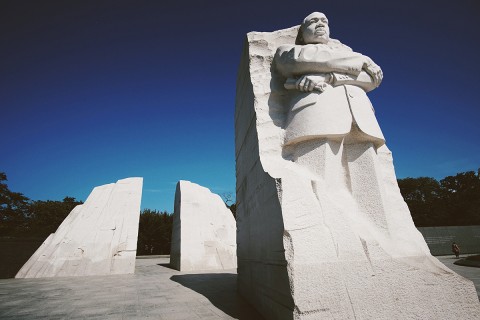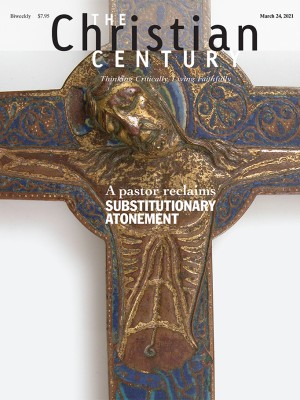Celebrating Easter on the anniversary of MLK’s death
The first Easter was a wrecked scene of dispirited disciples in the shadows of an insurrection.

This year Easter falls on April 4, the anniversary of the death of Martin Luther King Jr. That early spring evening in 1968 was ten days before the Feast of the Resurrection. In 2021, the second Easter of the coronavirus pandemic, we celebrate resurrection in the shadow of insurrection.
“The act of revolting against civil authority or an established government” is one dictionary definition of that term. Other sources specify that such an act is usually if not always violent. Historians and social scientists will parse insurrection and its meaning for January 6—along with words like rebellion, riot, and coup—for years to come.
Read our latest issue or browse back issues.
The prophet-poets of Israel were progenitors of the dissident Jesus, whose resistance to both the tyranny of imperial occupation and the corruption of the temple cult got him profiled, picked up, beaten up, and brutally killed. Many who stormed the Capitol on January 6 did so in his name. What kinds of Christian formation account for this—and for the fusion of Christian nationalism, White supremacy, and hypermasculinity into a smug and paranoid American theopolitics?
Easter has an edge that has been smoothed over by a less dangerous perhaps but no less problematic alliance between Christianity and the trifecta of individualism, capitalism, and American exceptionalism. When Jesus is summarily executed by the Roman authorities, his followers know that their lives, too, are subject to a brutal state apparatus that thrives on crushing agitators and vilifying the weak. Easter morning—for us, a celebration with flowers and finery—is, in the New Testament, a wrecked scene of dispirited disciples, women disbelieved for their wild tales, and the fearful realization that the words of this rabbi-provocateur will never align with the aims of empire, will always be deemed suspicious, even seditious.
That is, until they’re not—until they’ve been smoothed over and conscripted into service of the powerful and the unjust systems from which the powerful profit.
The prophets of ancient Israel spoke out of and into the geopolitical exigencies of their own time, as all prophets must. Yet the record of their witness does not read like a series of legislative demands to monarchs and the people seduced by them. The power of the prophets’ unrelenting critique is in poetry—in verses that hum and throb with fiery invective and volatile grief, that shimmer with unbidden joy. Prophets like Jeremiah give voice to deep sorrow and so offer language for their hearers to express their own: “For the hurt of my poor people I am hurt, / I mourn, and dismay has taken hold of me. / Is there no balm in Gilead? / Is there no physician there? / Why then has the health of my poor people / not been restored?” (8:21–22).
Others like Isaiah bring to speech a vision of God’s reign of justice, of creation healed and inhabited in peace. “For I am about to create new heavens / and a new earth . . . I am about to create Jerusalem as a joy, / and its people as a delight. . . . They shall build houses and inhabit them; / they shall plant vineyards and eat their fruit . . . for like the days of a tree shall the days of my people be” (65:17, 19, 21–22).
The authority of the biblical prophet-poets is not political but linguistic. Theirs is the world-making power of words, a power that does not demand regime change so much as it reveals that another reality is possible. This was the way of Jesus, too, and his willingness to absorb violence rather than perpetuate it, to bear trauma rather than inflict it, meant that his death, though not necessary, was inevitable. And while those first fearful followers did not recognize him on the Emmaus road, too disfigured by his torturers perhaps, as Daniel Berrigan once suggested, the early Christians would soon find their courage.
They would need it, since the torture would continue. Until it didn’t—until the church made its peace with the powerful, colluding with violence that took other forms, targeted other bodies.
What does it mean this Easter to practice resurrection after an insurrection that revealed, among other things, so much grievous error about the gospel’s relationship to the political order and the nature of Christian witness? Remembering that Jesus died from asphyxiation, where is new life possible this year and beyond, after so much suffocation and death—in hospital ICUs and on over-policed streets?
Exactly a year before King died, he denounced the Vietnam War and the triple evils of racism, poverty, and militarism. This was a solemn judgment on the body politic and was, to many, intolerable. In those last months his rage grew more visible. He was practiced in the rhetoric of grief. For his troubles he was profiled, picked up, beaten up, and, like the one from whom he learned nonviolent direct action, brutally killed.
But in that 1967 “Beyond Vietnam” speech, King, the prophet-poet, summoned his hearers then and now to a vision of God’s good shalom, to the work of transforming “this pending cosmic elegy into a creative psalm of peace.” He knew it would be costly. He expected it would mean his own early death. But he famously channeled the prophet Amos, forcefully issuing a call for justice and righteousness. Through the world-making power of words King announced that another reality is possible.
“Now let us begin,” he said. “Now let us rededicate ourselves to the long and bitter, but beautiful, struggle for a new world.” Let us.
A version of this article appears in the print edition under the title “Resurrection after insurrection.”






